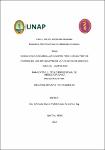Riesgo para desarrollar diabetes tipo 2 según test de Findrisk en los estudiantes de la facultad de medicina humana - Iquitos 2021
Abstract
A descriptive, non-experimental, cross-sectional, non-experimental study was done. The objective was to determine the risk of developing type 2 diabetes mellitus, according to the FINDRISK Test in the students of the Faculty of Human Medicine - Iquitos 2021.
The study population was constituted by 344 students of the Faculty of Human Medicine who were enrolled in the first term of the year 2021, from which a total number of 189 students were obtained as a sample. The data collection process was through the FINDRISK Test after signing informed consent, the FINDRISK Test consists of 8 questions, to which sex and level of study were added. The results show that 58.70% of students had a mildly increased risk, followed by 30.70% of students with moderate risk, and 10.60% had a high risk of developing type 2 diabetes in the next few years. It was also found that the most frequent factors in students were: no consume of fruits and vegetables and a history of having a family member with diabetes. Se realizó un estudio no experimental de tipo descriptivo y de corte transversal, con el objetivo de determinar el riesgo para desarrollar diabetes mellitus tipo 2, según Test de FINDRISK en los estudiantes de la Facultad de Medicina Humana-Iquitos 2021.
La población de estudio estuvo constituida por 344 estudiantes de la Facultad de Medicina Humana matriculados en el primer semestre del año 2021, de las cuales se obtuvo una muestra de 189 estudiantes. El proceso de recolección de datos fue a través del Test de FINDRISK previa firma de consentimiento informado. El Test de FINDRISK está constituido por 8 preguntas, al que se le agregó: sexo y nivel de estudio. Los datos obtenidos se procesaron por medio del software estadístico SPSS versión 24 y los resultados muestran que el 58.70% de estudiantes tienen riesgo ligeramente aumentado, seguido del 30.70% de estudiantes con riesgo moderado y el 10.60% presentó un riesgo alto de desarrollar diabetes tipo 2 en los próximos años. Así mismo, se encontró que los factores más frecuentes en los estudiantes fueron: el no consumo de frutas y verduras y el antecedente de tener un familiar con diabetes.
Collections
- Tesis [376]


